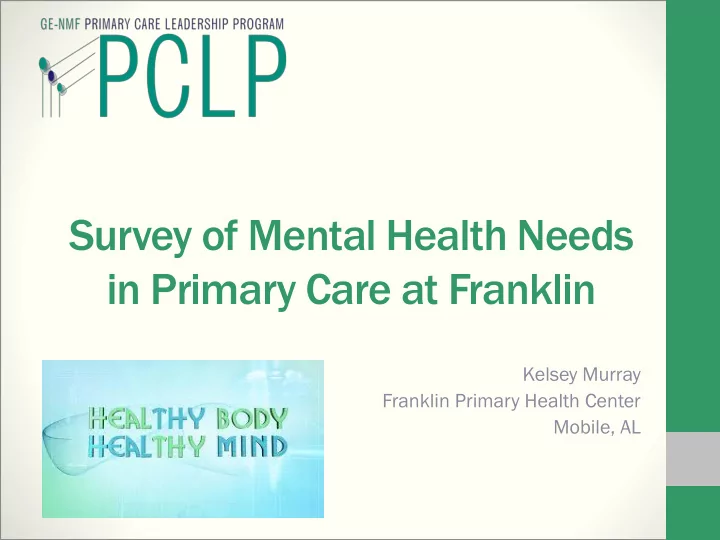

Survey of Mental Health Needs in Primary Care at Franklin Kelsey Murray Franklin Primary Health Center Mobile, AL
Introduction • Overview • Background, Methods, Results, Discussion, Recommendations • Personal interest in primary care & psychiatry / mental health • Louisiana Public Health Initiative at Franklin • Primary Care Capacity Project • Collaborative to Improve Behavioral Healthcare Access • Needs assessment of mental health • Provider’s views on mental health • How mental health & primary care might look at Franklin
Background • SBIRT = Screening, Brief Intervention, & Referral to Treatment • Number of adult patients with a mental health diagnosis • Any diagnosis 4665/30,735 =15% • Anxiety or depression = 2380 (both anxiety and depression = 363) • Mental Health Statistics • 50% of mental health care provided in primary care • 67-80% of psychotropic medications prescribed by primary care • Decreased life expectancy for people with mental illness • Why is mental health not addressed? • Lack of funds (& insurance), lack of mental health providers, lack of time • Stigma, limited access • Addressing mental health improves physical health • diabetes, heart failure, behavior change
Methodology • Patient Survey • Questions for depression, anxiety, bipolar, eating disorders, sleep, PTSD, substance abuse, safety, & social support • Given to 2 nd Floor Adult Medicine patients • Wednesday 7/17 – Friday 7/26 • Completed by patient while waiting for the provider • Provider Survey • Questions about thoughts about mental health: their comfort, time spent with patients, importance, integration with primary care, medications, & provider’s own mental health • Mailed to all providers at Franklin, returned via mail to me
Patient Survey Results 48/57 45 42 40 completed 40 Gender 35 29 30 PERCENTAGE 25 23 19 20 15 15 Female Male 10 8 8 10 Age 5 0 23% issues have made 17% 18-29 30-40 40-50 it somewhat difficult” or stated they had a mental 50-60 60+ “extremely difficult” health concern today
Provider Survey Results • Comfortable with mental health issues • Importance of integration, screenings • Mixed feelings about behaviorists, psychotherapy, Altapoint referrals • Don’t all feel like they have had adequate training, wish they had more training in psychiatric medicines • Substance abuse referrals underused • Providers tend to feel burnt out
Discussion • Prevalent mental health issues • Most common: sleep, anxiety, depression, PTSD • Frequently take time to discuss these concerns • Questions Raised: • How many patients at Franklin are underdiagnosed/undertreated? • How adequately are patients’ mental issues being treated • Further Research: • Longer and more extensive study • Opportunities for mental health trainings for PCPs • Pilot study of integration of a behaviorist to a team • Possible tangible results of findings • Providers made aware of mental health needs of patients • Some patients’ issues were addressed that day
Recommendations • Make sure to ask patients about these issues • Screenings could be done on paper or by MA/RN • Positive findings could be followed up with by provider or behaviorist • Improving mental health will likely improve physical health • Improve diabetes and hypertension • Decrease rates of smoking • Improve sleep and therefore improve heart health • Better quality of life, less pain, more functionality • Provide support for provider’s own mental health • Follow Ryan White HIV Model • Make providers aware of community resources, substance abuse, Altapoint
Conclusion • Important and prevalent issues! • Screenings are useful • Provider support needed • Improve health • Lower costs
Acknowledgements • Nurse Practitioner Holli Burden • 2 nd floor Adult Medicine team • Ms. Mitchell, Ms. Singleton, Ms. Perry, & Ms. McArthur • Mr. White & Mr. Anderson • Dr. Motley at USA Medical Center
Recommend
More recommend